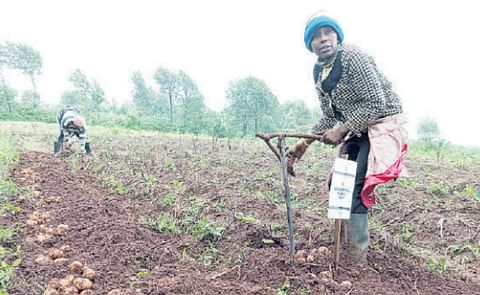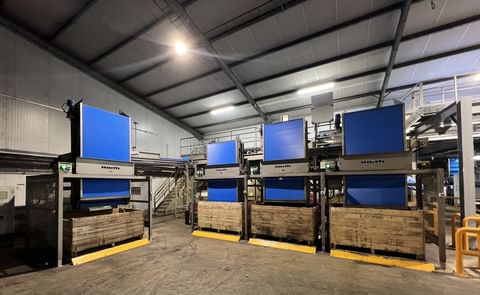Potato production through zero-tillage with straw mulch (PZTM)
CIP Introduces Zero Tillage Potato Farming Innovation in India, Bangladesh, Cambodia, and Peru

The International Potato Center (CIP) has launched a groundbreaking project in Bihar, India. This initiative introduces "Zero Tillage Potato Production through Rice Straw Mulch (PZTM)."
The project implemented by the Fund for the Promotion of Innovation in Agriculture (i4Ag), offers an innovative approach to potato farming.
By using zero tillage techniques and incorporating rice straw mulch, farmers in Bihar are experiencing a transformation that extends beyond mere cultivation—it's a journey towards a more sustainable and prosperous future, a concept note from the implementing agencies stated.
The initiative has been extended to three other major potato-growing countries Bangladesh, Cambodia, and Peru. PZTM is designed to address multiple challenges faced by potato farmers in these regions, such as land degradation, water scarcity, and climate change impacts.
For example, in many agricultural areas across India, soil over-exploitation and unsustainable practices have threatened the livelihoods of smallholder farmers and food security.
However, this innovative approach changes the game. Instead of conventional soil preparation, potatoes are planted directly into unworked soil and covered with rice straw after the rice harvest.
The potatoes mature within the rice straw, eliminating the need for tillage and ensuring a more eco-friendly and efficient farming process.

The project builds on a broad partnership between international organizations, NGOs, and national research institutes. It incorporates gender-sensitive trainings to empower both male and female smallholders to adopt and benefit from PZTM.
In India, women's self-help groups and locally produced farmer-focused videos facilitate knowledge sharing. In Bangladesh, "Nutrition Scholars" – local female farmers – educate their peers on PZTM and nutrition.
In Cambodia and Peru, cultivation methods are adapted to new socio-ecological contexts and different crops for mulching. Implementing partners for this project included International Potato Center (CIP), Wits University, Digital Green, Central Potato Research Station (ICAR-CPRS), Bangladesh Agricultural Research Institute (BARI), Prodipan, Mekong Institute (MI), Royal University of Agriculture (RUA), Asociación Pataz, Dr. Rajendra Prasad Central Agricultural University In a 2020 field-scale trial conducted by Chad Berry near Glenboro, Manitoba, positive results were observed for reduced-tillage potato production.
The trial aimed to compare conventional spring tillage with direct-seeded potatoes in terms of yield and quality. This was Berry's second attempt at reduced-tillage potato management, with the hope of reducing wind erosion and hill damage The trial, conducted in cooperation with Simplot Canada, involved direct seeding half of Berry's field into canola stubble.
The results showed that direct seeding did not significantly impact yield or quality compared to conventional planting methods. Tuber gravity, disease, and quality issues like hollow heart or sunburn showed no statistical difference between the two systems.
The benefits of this innovation are far-reaching. Zero tillage not only enhances soil fertility and increases carbon stocks but also extends the potato growing season by utilizing moisture remaining after rice harvest.
This enables the cultivation of potato varieties with longer maturation times. Additionally, using rice straw as mulch conserves water and suppresses weeds, pests, and diseases, reducing the dependency on harmful agrochemicals.
The PZTM project aligns with the United Nations' Sustainable Development Goals (SDGs) by promoting sustainable agriculture, reducing poverty, and addressing climate change.
It emphasizes the importance of sustainable intensification and agroecological practices, ultimately paving the way for a brighter and more sustainable future for agricultural communities in India and beyond.
The project implemented by the Fund for the Promotion of Innovation in Agriculture (i4Ag), offers an innovative approach to potato farming.
By using zero tillage techniques and incorporating rice straw mulch, farmers in Bihar are experiencing a transformation that extends beyond mere cultivation—it's a journey towards a more sustainable and prosperous future, a concept note from the implementing agencies stated.
The initiative has been extended to three other major potato-growing countries Bangladesh, Cambodia, and Peru. PZTM is designed to address multiple challenges faced by potato farmers in these regions, such as land degradation, water scarcity, and climate change impacts.
For example, in many agricultural areas across India, soil over-exploitation and unsustainable practices have threatened the livelihoods of smallholder farmers and food security.
However, this innovative approach changes the game. Instead of conventional soil preparation, potatoes are planted directly into unworked soil and covered with rice straw after the rice harvest.
The potatoes mature within the rice straw, eliminating the need for tillage and ensuring a more eco-friendly and efficient farming process.

Zero Tillage Potato Production
The project builds on a broad partnership between international organizations, NGOs, and national research institutes. It incorporates gender-sensitive trainings to empower both male and female smallholders to adopt and benefit from PZTM.
In India, women's self-help groups and locally produced farmer-focused videos facilitate knowledge sharing. In Bangladesh, "Nutrition Scholars" – local female farmers – educate their peers on PZTM and nutrition.
In Cambodia and Peru, cultivation methods are adapted to new socio-ecological contexts and different crops for mulching. Implementing partners for this project included International Potato Center (CIP), Wits University, Digital Green, Central Potato Research Station (ICAR-CPRS), Bangladesh Agricultural Research Institute (BARI), Prodipan, Mekong Institute (MI), Royal University of Agriculture (RUA), Asociación Pataz, Dr. Rajendra Prasad Central Agricultural University In a 2020 field-scale trial conducted by Chad Berry near Glenboro, Manitoba, positive results were observed for reduced-tillage potato production.
The trial aimed to compare conventional spring tillage with direct-seeded potatoes in terms of yield and quality. This was Berry's second attempt at reduced-tillage potato management, with the hope of reducing wind erosion and hill damage The trial, conducted in cooperation with Simplot Canada, involved direct seeding half of Berry's field into canola stubble.
The results showed that direct seeding did not significantly impact yield or quality compared to conventional planting methods. Tuber gravity, disease, and quality issues like hollow heart or sunburn showed no statistical difference between the two systems.
The benefits of this innovation are far-reaching. Zero tillage not only enhances soil fertility and increases carbon stocks but also extends the potato growing season by utilizing moisture remaining after rice harvest.
This enables the cultivation of potato varieties with longer maturation times. Additionally, using rice straw as mulch conserves water and suppresses weeds, pests, and diseases, reducing the dependency on harmful agrochemicals.
The PZTM project aligns with the United Nations' Sustainable Development Goals (SDGs) by promoting sustainable agriculture, reducing poverty, and addressing climate change.
It emphasizes the importance of sustainable intensification and agroecological practices, ultimately paving the way for a brighter and more sustainable future for agricultural communities in India and beyond.
Like to receive news like this by email? Join and Subscribe!
NEW! Join Our BlueSky Channel for regular updates!
Highlighted Company
Sponsored Content
Sponsored Content
Sponsored Content
Sponsored Content
Sponsored Content











